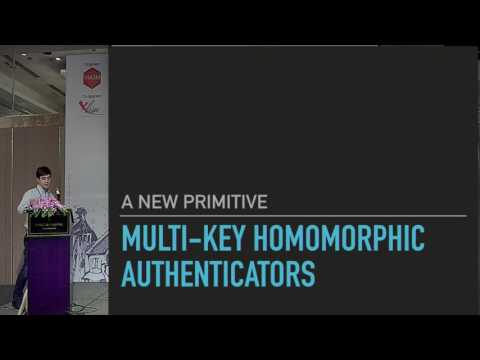Welcome to the resource topic for 2016/804
Title:
Multi-Key Homomorphic Authenticators
Authors: Dario Fiore, Aikaterini Mitrokotsa, Luca Nizzardo, Elena Pagnin
Abstract:Homomorphic authenticators (HAs) enable a client to authenticate a large collection of data elements m_1, . . . , m_t and outsource them, along with the corresponding authenticators, to an untrusted server. At any later point, the server can generate a short authenticator \sigma_{f, y} vouching for the correctness of the output y of a function f computed on the outsourced data, i.e., y = f(m_1,...,m_t). Recently researchers have focused on HAs as a solution, with minimal communication and interaction, to the problem of delegating computation on outsourced data. The notion of HAs studied so far, however, only supports executions (and proofs of correctness) of computations over data authenticated by a single user. Motivated by realistic scenarios (ubiquitous computing, sensor networks, etc.) in which large datasets include data provided by multiple users, we study the concept of multi-key homomorphic authenticators. In a nutshell, multi-key HAs are like HAs with the extra feature of allowing the holder of public evaluation keys to compute on data authenticated under different secret keys. In this paper, we introduce and formally define multi-key HAs. Secondly, we propose a construction of a multi-key homomorphic signature based on standard lattices and supporting the evaluation of circuits of bounded polynomial depth. Thirdly, we provide a construction of multi-key homomorphic MACs based only on pseudorandom functions and supporting the evaluation of low-degree arithmetic circuits. Albeit being less expressive and only secretly verifiable, the latter construction presents interesting efficiency properties.
ePrint: https://eprint.iacr.org/2016/804
Talk: https://www.youtube.com/watch?v=Tt4v2KL5P1Q
See all topics related to this paper.
Feel free to post resources that are related to this paper below.
Example resources include: implementations, explanation materials, talks, slides, links to previous discussions on other websites.
For more information, see the rules for Resource Topics .
